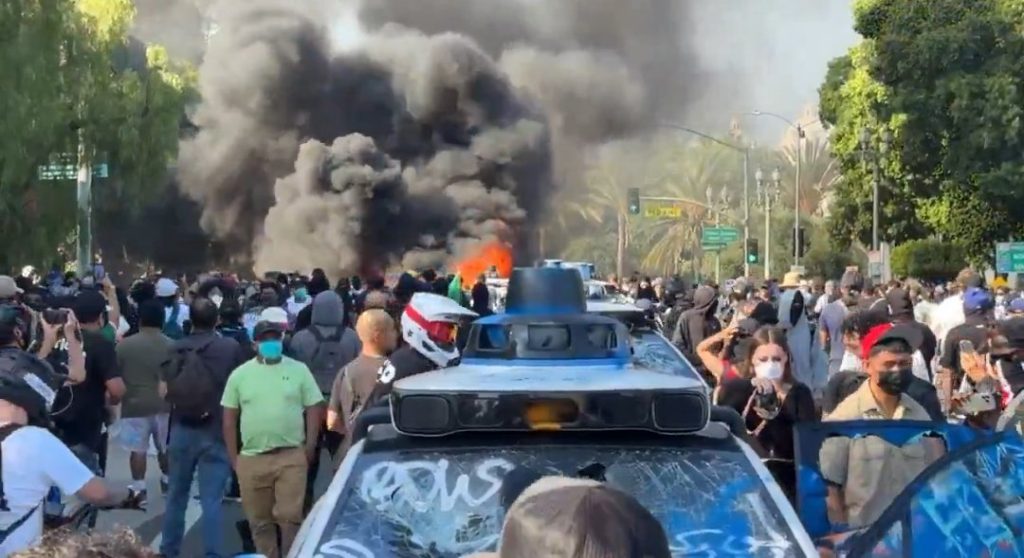In a shocking turn of events, Google’s autonomous driving startup, Waymo, has found itself at the center of a maelstrom during ongoing mass protests in Los Angeles. This incident not only highlights the intersection of technology and civil unrest but also raises questions about the vulnerabilities of autonomous vehicles in protest situations.
Protests Turn Violent
The protests in Los Angeles have been widely reported as a demonstration against anti-deportation policies. However, the situation escalated dramatically when multiple Waymo autonomous vehicles were summoned to the protest site only to be vandalized. Eyewitness accounts and social media reports detail how demonstrators systematically destroyed at least five Waymo vehicles, with a combined value estimated at over $600,000. The vehicles were reported to be set on fire and damaged with blunt objects such as bats and metal rods, showcasing a disturbing act of aggression towards technology that was initially designed to innovate mobility solutions.
It appears that agitators called several Waymo self-driving autonomous cars to the site of one of the demonstration in Los Angeles, before vandalizing and burning them for absolutely no reason. pic.twitter.com/fnTG9kkuyz
— OSINTdefender (@sentdefender) June 9, 2025
Waymo’s Autonomous Fleet in Context
Waymo’s self-driving vehicles operate in several U.S. cities, including Phoenix, San Francisco, and Austin, Texas. The company’s fleet primarily consists of Jaguar I-Pace cars, outfitted with an array of sophisticated sensors like LiDAR, 360-degree cameras, and radar systems, all working together to navigate complex environments. This approach sharply contrasts with Tesla’s strategy, which relies on neural networks and cameras to attain what they describe as full self-driving capabilities. This difference in technology is pivotal, as public perception of self-driving vehicles and their safety continues to evolve.
With plans to expand to ten new cities by the end of 2025—including Las Vegas and San Diego—Waymo aims to broaden its services and adapt to a growing number of urban drivers. The destruction of these vehicles during protests, however, raises concerns about the overall safety and resilience of autonomous services in public domains, especially as tensions flare.
Impact on the Autonomous Vehicle Landscape
This incident further complicates the already challenging landscape of autonomous vehicle technology. As cities potentially become less welcoming to self-driving services, Waymo might face logistical hurdles in expanding its operations and securing public trust. While Waymo is committed to improving its technology and increasing deployment, incidents like this can sour community relationships and delay progress.
Furthermore, responses from local law enforcement indicate that clashes took place during these protests, suggesting that the events caught the attention of police, who were already on alert for potential violence. Videos circulating across social media depict the chaos and destruction that ensued, contributing to a growing narrative about the unpredictability of public responses to advanced technology.
NEWS: Multiple self-driving Waymo cars, collectively worth upwards of $600,000, were vandalized by protesters today in Los Angeles. pic.twitter.com/JtAlHqbTNP
— Sawyer Merritt (@SawyerMerritt) June 9, 2025
The Broader Implications for Tech in Society
This incident raises broader questions about how society interacts with evolving technologies. The vandalism of Waymo vehicles can be interpreted as a reflection of societal tensions and frustrations that exist in various neighborhoods, particularly in urban settings where technological advancements can sometimes be viewed as threatening to the status quo. It also poses an inquiry into how tech companies might prepare for societal backlash against their innovations.
As both Waymo and Tesla prepare for significant expansions in their autonomous services, incidents of violence like this could prompt them to reconsider their outreach strategies and community engagement practices. Building trust with the public will be essential for the advancement of autonomous driving solutions.
The Waymo Massacre of June 8th, 2025 at least 4 brutally vandalized and destroyed pic.twitter.com/sIkKEaYfOh
— Intelschizo (@Schizointel) June 9, 2025
As the story develops, we anticipate further updates regarding the implications of this event for Waymo, its operations, and the future of autonomous vehicle technology in a rapidly changing social landscape.

